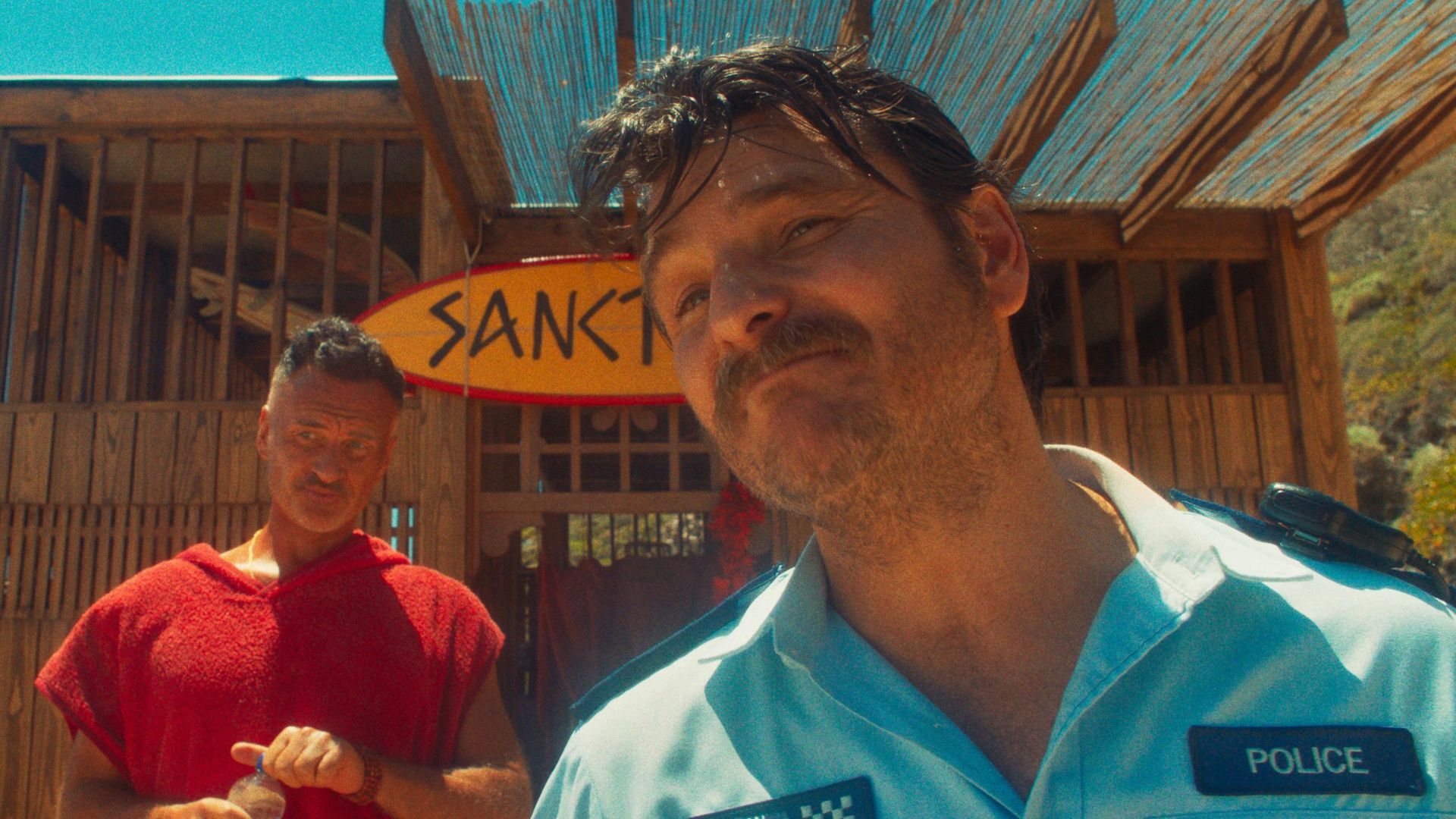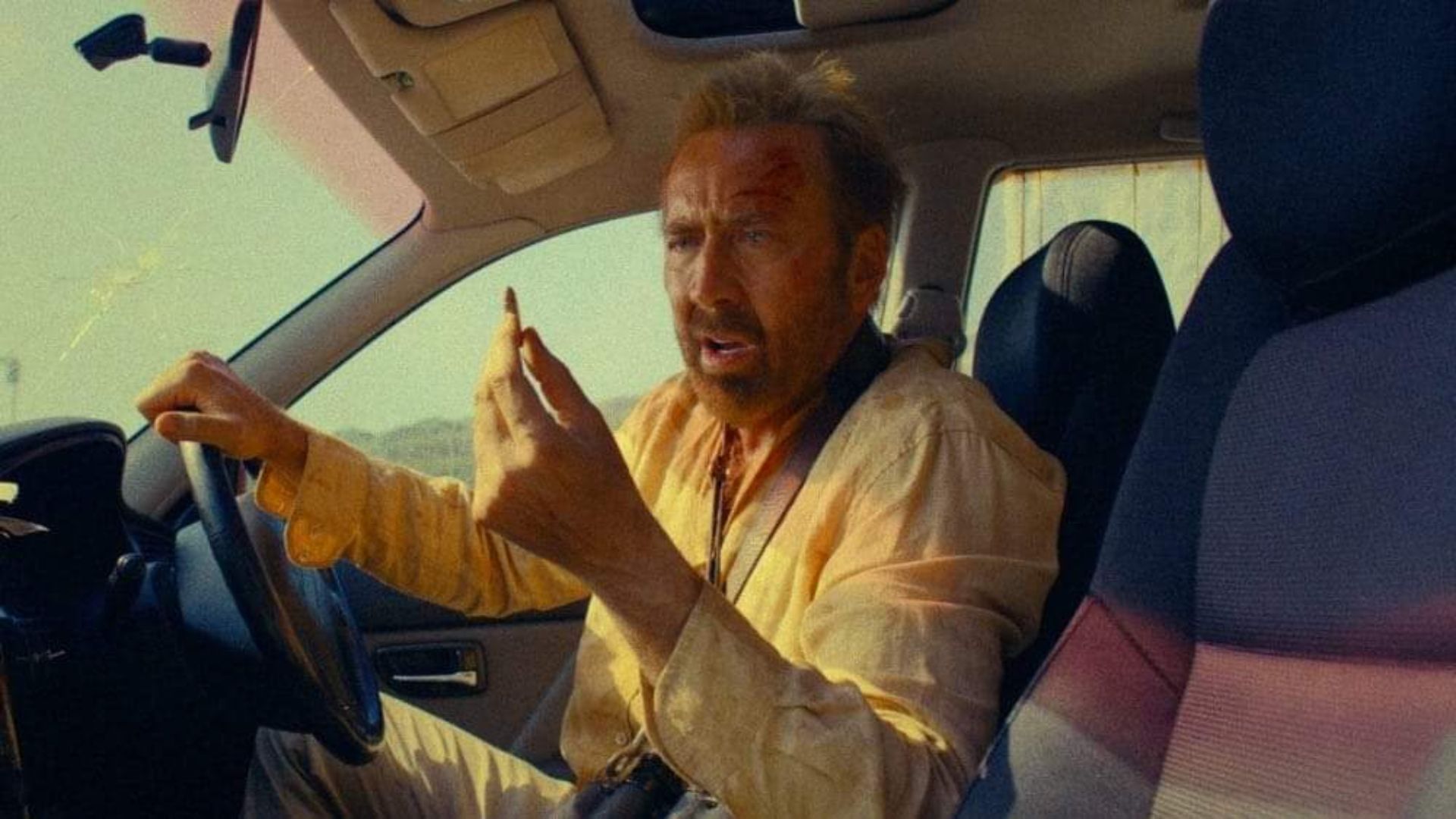
Though it didn’t do well in cinemas, the film The Surfer is finding an audience now that it’s available to stream. The movie follows a father who tries to bond with his son by taking him surfing, but they face hostility from the local surfers. Directed by Lorcan Finnegan, who also made the 2019 film Vivarium, The Surfer stars Nicolas Cage and Julian McMahon.
Despite some scenes feeling surreal and over-the-top, the movie generally presents everything as actually happening. This leads to the film’s conclusion, which clearly criticizes harmful ideas about what it means to be a man. Here’s a breakdown of the ending of The Surfer and what it all means.
What Happens at the End of ‘The Surfer’

Lionsgate and Roadside Attractions
Throughout the movie, Nicolas Cage plays a character called “the Surfer” who is constantly harassed by a local surfing crew. They steal his belongings – clothes, car, and surfboard – and generally make his life miserable. They even try to convince him he’s misremembering things from his past. Forced to live out of a run-down station wagon belonging to a man called “the Bum,” the Surfer’s situation starts to improve when a photographer shows him an old picture that unlocks memories of his previous life.
The image enrages the Surfer, reminding him of how the surfing group has wronged him. He immediately heads to the beach, attempting to drown one of its members. However, the group’s leader, Scally, intervenes. Scally reveals that this was all a test to see if the Surfer could become one of them. To fully earn their trust, the Surfer must complete one final task: destroy the Bum’s station wagon, which he ultimately does.
For a short while, everything appears peaceful for the Surfer. He gets his surfboard and car back, and he’s able to enjoy surfing with his son. However, this calm is shattered when the Bum, another victim of the group’s bullying, appears seeking revenge. He threatens the group with a gun. The Surfer manages to convince the Bum to spare him and his son by offering a shark-tooth necklace, a treasured prize the Bum’s son had won in a surfing contest before tragically being killed by Scally. Moved by this gesture, the Bum allows the Surfer and his son to surf, but then seeks out and kills Scally before taking his own life.
The Meaning of ‘The Surfer’s Ending, Explained

Lionsgate and Roadside Attractions
The surfers who act as the film’s villains are unpleasant and arrogant. While they’re unlikeable, they’re crucial to the film’s themes, embodying a harmful type of masculinity that’s become increasingly prevalent. Nicolas Cage explained in an interview with MovieWeb why this portrayal of toxic masculinity is important in The Surfer, stating:
We’re seeing a lot of what’s been called ‘bro culture’ these days, and it can be really harmful. I think a lot of people recognize it and see it in their own lives. This character is facing a smaller version of a problem that’s actually widespread – you can find it in workplaces, at the golf course, even in government. It’s a really common issue right now.
The film The Surfer goes beyond simply showing the stereotypical ‘bro’ lifestyle; it explores the harmful consequences of unhealthy masculinity. The group of surfers, who embody this toxicity, actually makes Cage’s character more aggressive and hostile through their constant attacks. While they may be trying to force him to become like them, this behavior ultimately leads to destructive outcomes. The Bum, unable to withstand their relentless negativity, eventually reaches a breaking point and violently retaliates, highlighting the devastating impact of this toxic environment.
The image of the homeless man lying on the beach echoes the Surfer’s memory of his father’s death. His father had taken his own life in the same spot, in the same position. This connection suggests several things. The Surfer, like both the Bum and his father, was facing a dark path, but he found a way to break free – even if it meant confronting those who hurt him. It also highlights a lack of support for men, which can lead to either destructive lifestyles or a feeling that life isn’t worth living.
‘The Surfer’s Ending Shows Nicolas Cage at His Best

Lionsgate and Roadside Attractions
Nicolas Cage has had a famously unpredictable career, with some truly great movies alongside some not-so-great ones. His film The Surfer initially appears to be one of the weaker entries, but Cage actually delivers a fantastic performance. It takes a uniquely committed actor to fully embrace the film’s bizarre premise, particularly when his character endures constant mistreatment. Cage fearlessly allows himself to be humiliated on screen, effectively conveying the film’s underlying ideas.
This role echoes Nicolas Cage’s performance in Mandy, another standout for the actor. Like the surfers in The Surfer, the villains in Mandy – a dangerous cult – torment Cage’s character, Red, ultimately leading to a violent breaking point after they kill his wife. Both films fall into the same category of visually striking, psychedelic horror, and they share a comparable grainy, colorful aesthetic.
Where to Watch ‘The Surfer’
If you didn’t quite grasp everything in The Surfer the first time you watched it, you’re in luck! It’s now available to stream on Hulu. If you don’t have Hulu, you can rent or buy the movie on platforms like Apple TV, Amazon Prime Video, or Fandango. You can also purchase a physical copy, which includes a Blu-ray, DVD, and a digital download code.
Read More
- Best Controller Settings for ARC Raiders
- Stephen Colbert Jokes This Could Be Next Job After Late Show Canceled
- 7 Home Alone Moments That Still Make No Sense (And #2 Is a Plot Hole)
- DCU Nightwing Contender Addresses Casting Rumors & Reveals His Other Dream DC Role [Exclusive]
- Ashes of Creation Rogue Guide for Beginners
- Is XRP ETF the New Stock Market Rockstar? Find Out Why Everyone’s Obsessed!
- 10 X-Men Batman Could Beat (Ranked By How Hard It’d Be)
- Final Fantasy 7 Remake Developers Discussed Making Cloud’s Buster Sword a Smaller, Regular Sword
- Mila Kunis Reveals One Parenting Rule With Ashton Kutcher
- Pokemon Go Has a New Debut Pokemon to Catch, But Only if Players Earn It
2025-11-09 01:18